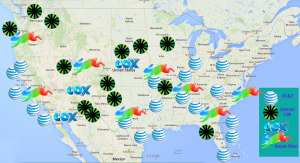Ultra high-speed Internet in the form of gigabit networks is becoming a critical tool in urban communities to foster innovation and stimulate job growth in a technology-driven economy.
Google Fiber spearheaded gigabit access in communities like Kansas City, Mo., and Provo, Utah. Internet speeds in these cities are up to 100 times faster than the broadband speeds most subscribers have. Gigabit refers to a speed of 1 gigabit, or 1,000 megabits, per second.
At a recent event, officials from three Connecticut cities introduced a joint request for qualifications to gauge whether gigabit networks are a viable option in the state. Stamford Mayor David Martin, New Haven Mayor Toni Harp and West Hartford Deputy Mayor Shari Cantor, along with other advocates, including state Consumer Counsel Elin Swanson Katz, announced an online application detailing goals, available resources and incentives for Internet service providers interested in leading the Northeast in the effort to establish gigabit networks.

The application deadline is Nov. 18. From there, city officials will determine who qualifies for a request for proposals, which could lead to a binding commitment between private companies and the cities. In return, the cities plan to support and offer any potential grant opportunities and fiber resources and other community assets, provide assistance with the permitting process and access to infrastructure. The cities have invited other Connecticut municipalities to join their effort by submitting an addendum describing their town”™s interest and assets.
“For Stamford, it”™s a multiprong approach,” said Thomas Madden, Stamford”™s economic development director. “It”™s about attracting businesses. We want the best services around at the most affordable prices. The monthly rates companies are paying are not comparable to other states. Sometimes services are not up to the standard they”™re looking for. Part of the reason for the development of gigabit networks in Connecticut is we have a lot of entertainment and digital media companies. They are high-data users, so they want to make sure they have the best available services to promote their businesses.”
While the rest of the country is expanding their gigabit networks, the Northeast has been slow to follow. Madden said that on a listening tour around the state in July, Stamford leaders met with high-tech business owners in Stamford, New Haven and West Hartford and confirmed that there is a strong business need for gigabit networks.
“There”™s a burgeoning consumer demand because businesses need to move data,” Madden said. “Businesses are telling us they”™re very constrained. We have lots of different service providers, but we want to make the pipeline bigger and cheaper. We want companies to invest in the Connecticut market. Like I-95, we need to expand our highway, so there”™s a free flow of traffic as opposed to the congestion there is now.”
The request for qualifications will cause competition between Internet service providers and potentially provide more gigabit networks as opposed to fewer, said Bill Vallee, broadband policy coordinator for the state Office of Consumer Counsel.
“With the whole controversy over net neutrality, millions of people have questions for the FCC, including: How will the Internet be regulated?” Vallee said. “There is no room for competition right now. Once you get on gigabit networks, there are all these contracts. It becomes a monopoly. Our goal is to hopefully introduce competition into this market.”
The U.S. lags behind other countries in Internet speeds, which has been partly attributed to a lack of competition. Comcast, AT&T and Time Warner dominate the market in the U.S.
“We pay 300 to 400 times more than South Korea for a slower speed,” Vallee said. “Go back 100 years, and it”™s equivalent to the Standard Oil Trust model. They have a huge customer base, so they can say to a fiberglass maker, ”˜I”™m gonna pay you this amount for your fiberglass, and since I”™m the only supplier, I”™m going to sell it for a higher price.”™”
Recently, the state consumer counsel joined Connecticut Attorney General George Jepsen and made a settlement with Stamford-based Frontier Communications to expedite the deal of buying AT&T”™s wireline business and statewide fiber network that provides services to residential, commercial and wholesale customers in the state. For $2 billion, Frontier acquired AT&T”™s local telephone exchange business, which has about 900,000 access lines, 415,000 broadband customers and 180,000 wireline service, fiber network and U-verse video and satellite television customers, according to CBS Connecticut.
As part of the deal, Frontier has agreed to spend $63 million over the next three years to improve its broadband services, including U-verse and DSL broadband networks, said Brigid M. Smith, assistant vice president of corporate communications at Frontier.
“Since we will own lines in the state by the RFQ”™s due date, we intend to respond to it in a manner commensurate with our commitments to bring high-quality and enhanced networks to communities throughout Connecticut,” Smith said. “Through this investment, Frontier will expand IP broadband data speeds of 10 megabits per second or greater to more than 100,000 additional households and construct an ultra-high-speed middle-mile fiber network connecting central offices across the state. In addition, we have committed to deploying fiber to any business that requests it.”


















Comments 2